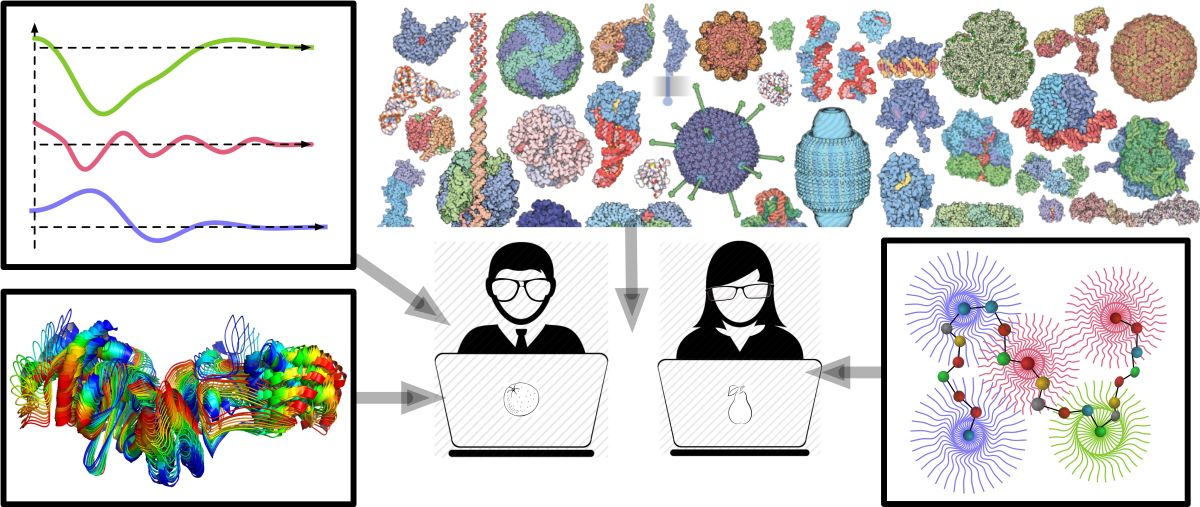Speaker
Description
Life has adapted to extreme conditions on Earth. One of the most striking evidences of adaptation to extreme environments are bacteria that are capable of thriving in a vast temperature range, from below 0° C in glacial waters to above 100° C in deep-sea hydrothermal vents. It is known that the individual molecular components of these organisms, exhibit enhanced stability and resistance to the temperature stress. A research focus lies on the proteins, which are the most abundant and less stable macromolecules in the cell. However, the link among the individual protein stability, and the process of cell death caused by the raise of temperature is not yet clear. Understanding the biophysical determinants of cellular thermostability would be fundamental from a theoretical, biotechnological and clinical prospective [2], [3].
In a theoretical work by Dill and his co-workers, [1], it has been proposed that the temperature induced cell death follows a collective unfolding of the proteome, with the entire set of proteins approaching their individual melting in a narrow temperature range.
However, this picture has been recently challenged by further experimental and simulation work, [4], [5]. Experimentally, it was possible to monitor the amount of proteins actually unfolding at the cell death temperature. These recent studies showed that it is only a small fraction of proteins that unfold at the cell death temperature. This was further confirmed by Sterpone and his co-workers, who investigated the dynamical profile of the proteins in the E. Coli, a mesophilic bacterium. Using a combination of Neutron-scattering experiments and Molecular dynamics simulations they showed that a dynamical catastrophe occurs at the cell death temperature which is caused by only around 10% of the proteins unfolding [6].
The goal of this project is to combine all-atom Molecular Dynamics simulations and Neutron Scattering experiments to further investigate the dynamics of the proteins in the case of extremophilic bacterium and to reveal whether it is a small set of proteins that unfold as it has been shown for the mesophile. The bacteria selected for this investigation are the P. Arcticus, a psychrophile, and the A. Aeolicus, a hyperthermophile.
In this occasion, it will be presented how MD simulations and Neutron scattering experiments can be combined to model the dynamics of the proteins and to quantify the number of unfolded proteins at the cell death temperature. Different dynamical aspects that have been revealed so far using MD simulations and NS experiments, such as the global diffusion coefficient and the mean square displacement of the proteins of these two bacteria, will be demonstrated.
- Dill, K. A. , Ghosh, K. , Schmit, J. D. (2011) ‘Physical limits of cells and proteomes’
PNAS 108,17876 - Coffey, D. S. , Getzenberg, R. H. , DeWeese, T. L. (2006) ‘Hyperthermic biology
and cancer therapies: A hypothesis for the Lance Armstrong effect’ JAMA 296, 445. -
Polizzi, K. M., Bommarius, A. S. , Broering, J. M. , Chaparro-Riggers, J. F. (2007)
‘Stability of Biocatalysts’ Curr. Opin. Chem. Biol. 11, 220 -
Leuenberger, P. et al. (2017) ‘Cell-wide analysis of protein thermal unfolding reveals
determinants of thermostability’, Science, 355, 6327 -
Jarazab, A. et al. (2020) ‘Meltome atlas—thermal proteome stability across the tree of life’, Nature Methods, 17, 495.
-
Daniele Di Bari, Stepan Timr, Marianne Guiral, Marie-Thérèse Giudici-Orticoni, Tilo Seydel, Christian Beck, Caterina Petrillo, Philippe Derreumaux, Simone Melchionna, Fabio Sterpone, Judith Peters, and Alessandro Paciaroni (2023) ’Diffusive Dynamics of Bacterial Proteome as a Proxy of Cell Death’, ACS Central Science 9 (1), 93-102
| Submitting to: | Integrative Computational Biology workshop |
|---|

